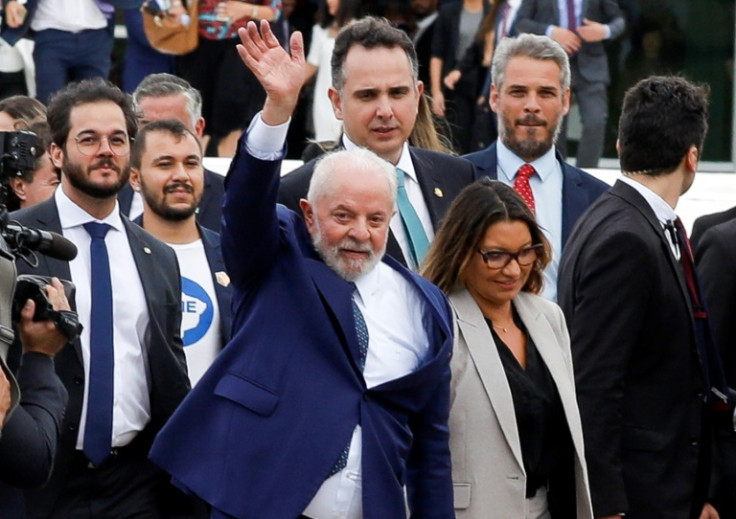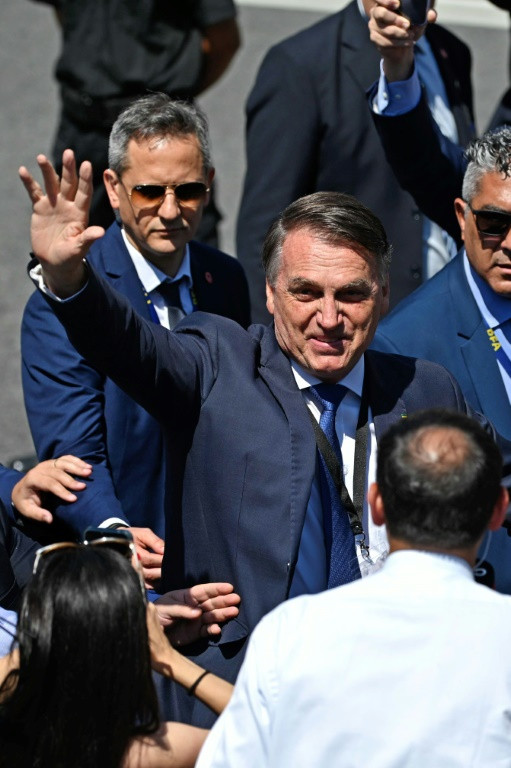Brazil's Lula Still Losing Digital Battle To Bolsonaro

Wearing a blue shirt with the sleeves rolled up, President Luiz Inacio Lula da Silva smiles as he gushes on his love of Brazilian music, and then segues into a barstool-style dissertation on football.
But for all Lula's working-class roots and folksy appeal, the veteran leftist's live sessions on social media just can't seem to match those of the overpowering, base-mobilizing digital phenomenon that is his predecessor, far-right ex-army captain Jair Bolsonaro.
Bolsonaro, the man dubbed the "Tropical Trump," wrote the book on blending social media and politics in Brazil, delivering weekly Facebook live addresses from the presidential palace throughout his time there, from 2019 to 2022.
Even now, out of power for more than a year and harried by various criminal investigations, Bolsonaro continues to reign supreme in the digital realm -- a key battleground as Brazil heads for local elections this October.
A YouTube live session that Bolsonaro did Sunday night with his sons racked up more than two million views -- more than all of Lula's "Conversations with the President" segments combined.
"By any measure, the radical right's dominance on social media in Brazil is abundantly clear," said Arthur Ituassu, a professor at Rio de Janeiro Pontifical Catholic University.
The phenomenon was on full display on January 8, as Brazil marked the first anniversary of riots by Bolsonaro supporters who stormed the presidential palace, Congress and Supreme Court a week after Lula's inauguration, protesting their candidate's narrow election loss.
Lula marked the date with a solemn speech paying tribute to democracy and condemning the "attempted coup."
But on social media, the day belonged to Bolsonaro backers, who declared it "Patriot's Day."
Of the 25 most-shared posts on X, the former Twitter, on January 8 in Brazil, 20 came from Bolsonaro supporters, according to a report by consulting firm Bites for newspaper O Globo.
Brazil, a sprawling country of 203 million people, is the third-biggest social media consumer in the world, after India and Indonesia, according to analytics company Comscore.
The Lula administration knows the political stakes.
In January, it launched a 197-million-reais (nearly $40 billion) tender seeking firms to handle its digital communications.
Lula, 78, has so far struggled to match the online success of the 68-year-old Bolsonaro, experts say.
"Unlike Bolsonaro, Lula doesn't use his live addresses to shape the traditional media's news agenda or fire up his base to engage in an online conversation," said Viktor Chagas, a cultural studies and media professor at Fluminense Federal University.
Lula's live segments on social media were originally meant to be weekly. But he last did one on December 19.
And Lula lost a key player this week, when his social media-savvy justice minister, Flavio Dino, stepped down to take a seat on the Supreme Court.
"Everyone in the administration is going to have to give their all to generate more online engagement," Lula's communications chief, Paulo Pimenta, told AFP.
"We don't have a Pele or Maradona we can send on for Dino."
But Pimenta argues the digital playing field is "balanced" in Brazil.
The far-right may have more deeply engaged online warriors, "but we have a bigger base, with people who are less engaged," he said.
He attributed the far-right's strength mainly to spreading spurious content.
"They've made (social media) a land of impunity, where lies, fake news and disinformation win," he said.
Bolsonaro's camp meanwhile claims it is the victim of "censorship" and "persecution," such as when the courts or social media platforms themselves have forced the removal of alleged disinformation, or when electoral authorities last June barred Bolsonaro from running for office for eight years over his unproven fraud allegations against Brazil's voting system.
But there is another reason for the far-right's social media prowess, experts say: language.
"Their message is much more adapted to people's day-to-day. It appeals directly to the ordinary citizen," said Chagas.
By engaging in "a brutal simplification of the issues," the far-right "has more impact and mobilizes its base better," said Victor Piaia, a professor of media and communications at the Getulio Vargas Foundation.
That could be a deciding factor in this year's elections, he said.
"Social media undoubtedly plays a central role."

© Copyright AFP 2024. All rights reserved.




















